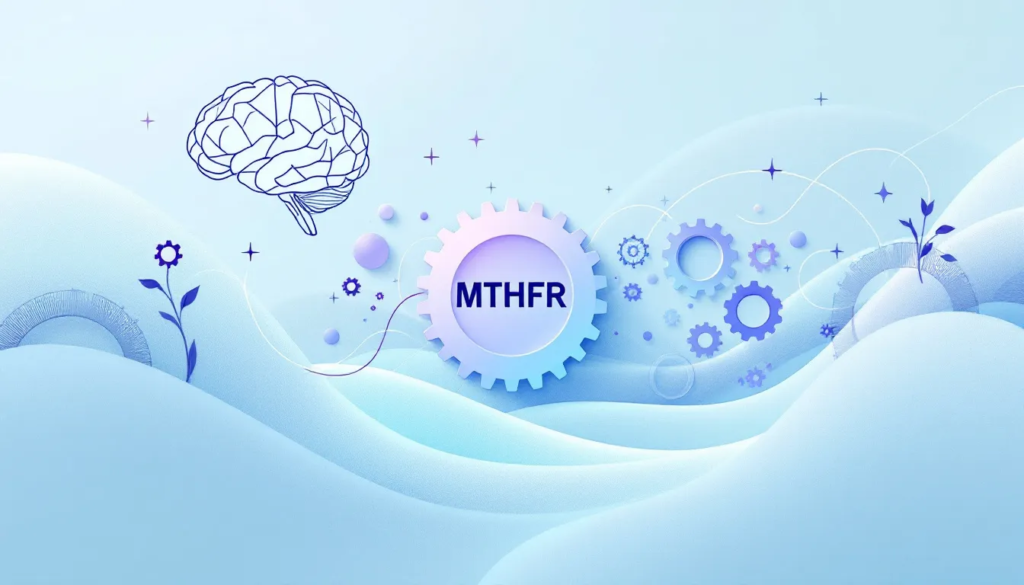Struggling with insomnia? It might be due to MTHFR gene mutations. These mutations affect folate processing and can lead to sleep issues. In this article, you’ll learn about the link between MTHFR and insomnia and find potential solutions.
Key Takeaways
MTHFR mutations can disrupt folate metabolism, leading to insomnia and poor sleep quality due to elevated homocysteine levels.
Methylfolate supplementation is a key strategy for managing insomnia linked to MTHFR mutations, helping improve overall sleep quality.
Lifestyle interventions, including dietary changes and stress management, are essential in tandem with supplements for addressing insomnia related to MTHFR gene variants.
Understanding MTHFR and Its Role in the Body

The MTHFR gene, short for methylenetetrahydrofolate reductase, plays a pivotal role in processing folate, a vital nutrient for DNA synthesis and protein modification. This gene helps your body break down and utilize folate and amino acids, which are crucial for various bodily functions. Folate, often found in leafy greens and legumes, is essential for the methylation cycle—a biochemical process critical for DNA production and repair, neurotransmitter synthesis, detoxification, and homozygous methylenetetrahydrofolate reductase.
Common mutations in the MTHFR gene, such as C677T and A1298C, can hinder the efficient breakdown of nutrients. These MTHFR mutations can lead to elevated homocysteine levels, affecting overall health and potentially contributing to sleep disturbances. However, it’s essential to note that having an MTHFR mutation and a genetic mutation does not guarantee adverse health effects. Instead, it may require extra nutritional support to maintain optimal health.
Recognizing the MTHFR gene’s function is pivotal in tackling health concerns. Knowledge of your genetic makeup can guide effective measures like methylfolate supplementation to enhance overall well-being, be it sleep issues or other health problems.
How MTHFR Mutations Impact Sleep

Clinical sleep medicine increasingly acknowledges the connection between MTHFR mutations and sleep disturbances. These mutations can disrupt folate metabolism, leading to issues like insomnia. For example, those with the MTHFR polymorphism C677T may produce less melatonin, essential for regulating sleep, causing fragmented sleep and difficulty in achieving restorative rest.
Although MTHFR mutations affect sleep, other genetic factors are also influential. Comprehensive genetic testing, like Sterling’s App, can uncover additional genes impacting sleep, offering a holistic view of sleep health. This approach ensures all genetic contributors to sleep disturbances are considered and managed.
Elevated Homocysteine Levels and Insomnia
High homocysteine levels, commonly caused by MTHFR mutations, are associated with chronic insomnia and poor sleep quality. These elevated serum homocysteine triggered levels can hinder the conversion of homocysteine to methionine, disrupting essential methylation processes and potentially leading to neurological and psychiatric complications that exacerbate sleep issues.
Those with the MTHFR C677T polymorphism often experience reduced enzyme functionality, leading to high homocysteine levels that affect sleep. Targeted interventions like methylfolate supplementation can help improve sleep quality and lower the risk of chronic insomnia.
The Connection Between MTHFR and Mental Health

The link between MTHFR mutations and mental health is well-documented, significantly affecting sleep. Variants like C677T and A1298C are associated with higher risks of major depression and schizophrenia, particularly in certain populations. These mental health issues can worsen sleep disturbances, creating a vicious cycle of poor mental and sleep health.
Research shows that those with the MTHFR C677T mutation are more likely to develop bipolar disorder, which also negatively impacts sleep. Disrupted neurotransmitter production due to MTHFR mutations can hinder restorative sleep, emphasizing the need to address both mental health and sleep issues in affected individuals.
Methylfolate supplementation can be vital in managing these challenges. It helps improve mood and reduce anxiety, potentially breaking the cycle of poor sleep and mental health. However, monitoring for side effects like irritability and digestive issues is necessary to ensure the benefits outweigh any drawbacks.
Genetic Predisposition and Insomnia
Genetic predisposition plays a significant role in the development of chronic insomnia, particularly in individuals with MTHFR polymorphisms like C677T. These mutations can lead to chronic insomnia that does not respond to standard treatment options, making it essential to explore alternative interventions. Genomic analysis has been successful in identifying MTHFR mutations in patients suffering from treatment-resistant insomnia, paving the way for targeted supplementation.
A case study demonstrated that a patient with chronic insomnia resistant to traditional treatments showed significant improvement after targeted supplementation for an MTHFR mutation. This example highlights the potential benefits of personalized approaches to managing insomnia, especially for those with genetic predispositions.
Managing Insomnia with Methylfolate Supplementation

Methylfolate supplementation is a common strategy for managing insomnia linked to MTHFR mutations. It tackles the metabolic issues caused by these mutations, helping to relieve insomnia symptoms.
The process involves starting methylfolate supplements, monitoring side effects, and adjusting the dosage for optimal results.
Starting Methylfolate Supplements
Beginning methylfolate supplements can significantly benefit individuals with MTHFR mutations. Choose a reputable brand offering the bioactive form, like L-methylfolate. Start with a low dose, around 200 to 400 mcg per day, and gradually increase as tolerated. Consult a healthcare provider to determine the appropriate dosage for individual needs.
Closely monitor symptoms, both positive and negative, after starting methylfolate supplementation. Stay alert for common side effects during the initial period to manage any issues effectively. If adverse effects occur, consider reducing the dosage or discussing alternative options with a healthcare provider.
Monitoring Side Effects
Monitoring side effects is crucial when taking methylfolate supplements. Using quality supplements and following an appropriate dosage schedule can reduce side effects like irritability, sleep disturbances, and gastrointestinal discomfort. Dosage adjustments may be necessary to balance sleep improvements and side effects.
Gradually reducing the dosage under medical guidance can help mitigate withdrawal symptoms or the return of previous health issues. Careful monitoring ensures the benefits of supplementation outweigh any drawbacks, aiding better sleep and overall health.
Adjusting Dosage for Optimal Results
Adjusting the methylfolate dosage based on individual tolerance and response is often necessary. This process should be conducted under medical guidance to ensure effective insomnia management without unwanted side effects.
Finding the optimal dosage can significantly improve sleep quality and overall well-being.
Lifestyle and Dietary Interventions Targeting MTHFR-Related Insomnia

Besides methylfolate supplementation, lifestyle and dietary interventions are crucial for managing insomnia related to MTHFR mutations. Incorporating natural folate sources like leafy greens and legumes into your diet can mitigate the effects of these mutations on sleep. Regular physical activity and stress management techniques, such as mindfulness and yoga, can also enhance sleep quality.
Starting with a low dose of methylfolate, like 5 mg, and gradually increasing it can help avoid initial side effects such as anxiety. These lifestyle and dietary interventions, combined with methylfolate supplementation, offer a comprehensive approach to managing insomnia and improving overall health.
Clinical Approaches and Whole Genome Sequencing Analysis
Clinical approaches like whole genome sequencing analysis can identify gene polymorphism and other genetic factors contributing to insomnia. Advanced genetic testing methods enable the discovery of pathogenic variants that standard tests may miss. Bioinformatics tools used with whole genome sequencing can predict the impact of MTHFR mutations on protein function.
Genomic analysis identifying MTHFR polymorphisms can lead to targeted interventions that significantly improve sleep quality in resistant insomnia cases. This approach ensures a personalized treatment plan, addressing the root cause of insomnia and offering long-term relief.
Traditional Pharmacologic Treatments vs. Natural Supplements
Traditional pharmacologic treatments for insomnia, like sedative-hypnotics, often come with side effects and dependency risks. Long-term use can cause issues like rebound insomnia, making natural supplements a more appealing option. Supplements like methylcobalamin and folic acid address the root cause of insomnia by supporting natural body processes.
Natural remedies such as melatonin or valerian root are often used to enhance sleep without the dependency risk linked to many prescription sleep aids. Combined with targeted methylation support, these supplements offer a holistic approach to managing insomnia, providing fewer side effects and long-term benefits.
Summary
Understanding the link between MTHFR mutations and insomnia opens up new possibilities for managing sleep health. By addressing the root causes through methylfolate supplementation, lifestyle changes, and advanced genetic testing, individuals can achieve better sleep and overall well-being. Embrace this knowledge, take proactive steps, and reclaim your nights for a healthier, more restful life.
Frequently Asked Questions
What is the MTHFR gene and why is it important?
The MTHFR gene is vital for processing folate and amino acids, which are essential for DNA synthesis and protein modifications. Understanding its role is important for managing health issues associated with its mutations.
How do MTHFR mutations impact sleep?
MTHFR mutations can disrupt folate metabolism, negatively impacting melatonin levels and contributing to sleep disturbances such as insomnia. Addressing these imbalances may help improve sleep quality.
What are the benefits of methylfolate supplementation for insomnia?
Methylfolate supplementation effectively enhances neurotransmitter production, which can lead to improved sleep quality, particularly for those with MTHFR polymorphisms. This could be a beneficial option for managing insomnia.
Are there side effects to taking methylfolate?
Yes, methylfolate can cause side effects such as irritability, sleep disturbances, and gastrointestinal discomfort. It’s important to monitor these effects and consider dosage adjustments as needed.
How can lifestyle changes help manage MTHFR-related insomnia?
Making lifestyle changes such as eating more folate-rich foods, engaging in regular exercise, and utilizing stress management techniques can significantly enhance sleep quality for those with MTHFR-related insomnia. Prioritizing these adjustments is crucial for better overall health and restful sleep.

